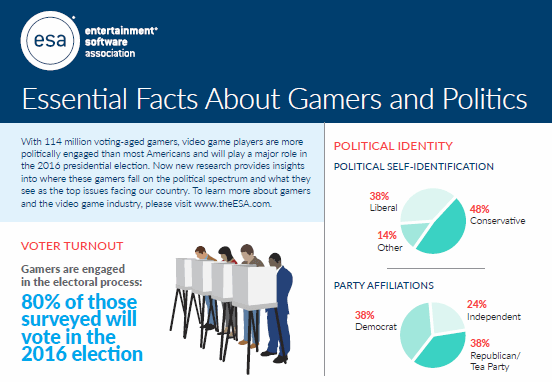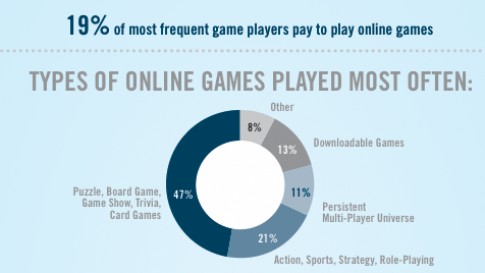From a recent study compiled by the Entertainment Software Association, which is a “U.S. association dedicated to serving the business and public affairs needs of companies that publish computer and video games for video game consoles, handheld devices, personal computers and the Internet”, gamers might have a little more political engagement than previously thought.
The headline “Eight out of 10 Gamers Plan to Vote in 2016 Election” is front and center at the top of the study — so what can we glean from this information?
Traditional thoughts about political activity and gamers might lead down a few narrow paths: the anarchist/leftist who wants to see the world “burn”, or the misogynistic male conservative who streamlines pure adrenaline. This is pretty wrong, but not entirely. Gamers and their political affiliations, because of the mainstream base video games now enjoy, are more closely related to the nation at large. A nation that holds elements of both the left, far left, right, far-right, and center…ish.

For some numbers to get your mind spinning, gamers in 2012 had about 79% voter turnout compared to the general public with 69%. In this next election, there will be an even higher gamer turnout. Michael D. Gallagher, president and CEO of ESA, estimates that “100 million gamers will vote next year” and that they will be ” engaged, informed and hold strong opinions on critical issues.”
Scary? Possibly. Yet, gamers are concerned with more liberal values of equality, justice, and upward mobility for the majority.
Overall, they said the most important issue is the economy, followed by terrorism, unemployment, and education. Among young voters (aged 18-24), in particular, the economy and race relations were reported as top issues, followed by class disparity and education.
That’s not to say that gamers don’t hold some traditionally conservative views as well, especially since the majority of gamers are identified as “conservative”. Here are some more figures to lay bare the political machinations of young gamers:
- 42 percent support government providing parents more educational choices by providing taxpayer-funded vouchers to help pay for private or religious schools;
- 40 percent said the military should be used “as often as is needed to promote U.S. policies,” while another 40% said diplomatic solutions should be the aim of foreign policy.
This information was gained by polling over 4,000 gamers, all over 18, with an online questionnaire, a typically insidious way to gather information from the masses. This is an inescapable fact of the future political system; gamers and game companies represent a lot of capital — something that politicians will keep a close eye on.
Do you agree with this information presented by the ESA? Even with high voter turnout, doesn’t this still represent a white/male segment of the voting public? Let us know what you think in the comments below.








